Many people are saying that impeachment is unconstitutional, or that the House is going about its investigation in an unconstitutional way. Like many things that "many people are saying," that& #39;s not true. This thread attempts to explain why...
First, let& #39;s clear up some misconceptions. Impeachment isn& #39;t about overturning or undoing the results of an election. It& #39;s the mechanism provided in the Constitution for investigating and potentially removing a president who abuses his or her power *after* the election.
To be clear, the results of the 2016 election aren& #39;t being contested. The election isn& #39;t being reversed or recalled. Donald Trump won the election in 2016, and he became president in 2017. He& #39;s being impeached for abusing his office two years later, in 2019.
A presidential campaign has two candidates on its ticket. Voters who elected Trump to be president also elected Pence to be vice president. If Trump were to be removed from office, then Pence, the elected vice president, would become president. Nothing is "overturned."
Another lie surrounding the House hearings is that they& #39;re for "Democrats only." This is wrong. More than 40 House Republicans are able to participate in all of the closed-door sessions, and can question witnesses! Many have opted not to. As to why, you& #39;d have to ask them.
A third misconception is that the House is somehow denying the president& #39;s due process rights. Such claims typically invoke the 5th or 6th Amendments to the Constitution, but these aren& #39;t relevant to the House impeachment investigation.
The 5th Amendment affirms five rights. Notice that due process is guaranteed when "life, liberty, or property" are in jeopardy. Impeachment jeopardizes none of those. (I rather doubt Congress has any plans to nationalize Trump& #39;s hotels, so that part& #39;s out too.)
The 6th Amendment begins with the clause "In all criminal prosecutions," and this caveat applies to the rights enumerated thereafter. Impeachment isn& #39;t a criminal prosecution; ergo, the 6th Amendment doesn& #39;t apply to impeachment proceedings.
(Incidentally, the president *will* receive due process rights - not to mention a friendly jury instead of an impartial one! - during the Senate trial. More on that later.)
Now, let& #39;s explore exactly what the Constitution says regarding the impeachment process. It splits things up into two parts: 1) impeachment, which is the inquiry/investigation phase, and 2) a subsequent trial, by which the President may be removed from office.
Article 1, Section 2 of the Constitution says: "The House of Representatives shall chuse their Speaker and other Officers; and shall have the sole Power of Impeachment." Impeachment, the part that& #39;s happening now, is delegated to the House of Representatives.
Article 1, Section 3 delegates the trial portion of the process to the Senate: "The Senate shall have the sole Power to try all Impeachments. When the President of the United States is tried, the Chief Justice shall preside..."
The Constitution doesn& #39;t prescribe any specific or mandatory steps the House must take. This means the House gets to establish its own rules and procedures. There& #39;s *no* requirement for open hearings (or even any hearings at all!), or for specific votes to be held, etc.
Generally, the House sets its own rules by drafting a House Resolution and putting it up for a vote. If it passes, the rules take effect. That means whichever party has the majority of House members is able to set or change various House rules and procedures as they see fit.
In 2015, while the Republican-controlled House was conducting investigations into the Benghazi attack, they set some new House rules. For example, they made it so the majority can issue subpoenas or call witnesses without the minority party& #39;s blessing. https://www.wilmerhale.com/en/insights/client-alerts/expanded-subpoena-powers-in-new-congress">https://www.wilmerhale.com/en/insigh...
Those rules, enacted by Republicans in 2015, are still in effect. Relevant House committee chairpersons get the final say as to whether or not their committees issue subpoenas or call witnesses. The minority doesn& #39;t have to approve (or even be consulted). https://blogs.wsj.com/washwire/2015/01/13/several-house-committee-chairmen-to-get-unilateral-subpoena-power/">https://blogs.wsj.com/washwire/...
Private depositions in the House impeachment inquiry have all taken place under these rules. Closed-door hearings, with witnesses called only by the majority party, where questioning can be done by staff attorneys... Again, these rules were set by Republicans several years ago.
On October 31, 2019, the House voted on and passed House Resolution 660. This established the rules under which the public hearings are operating. Democrats, now being in the majority, were able to design these rules. https://www.congress.gov/bill/116th-congress/house-resolution/660/text">https://www.congress.gov/bill/116t...
H.R. 660 also creates the procedure by which the impeachment will conclude in the House. The Judiciary Committee will be able to hold their own hearings, if they choose, and can draft and deliver formal articles of impeachment to the full House.
If the Judiciary Committee returns articles of impeachment, the House will conduct a vote on whether or not to advance them to the Senate. With Democrats in the majority, such a vote seems likely to pass. At that time, the president will have been "impeached."
After impeachment in the House, a trial would be conducted in the Senate. The Constitution prescribes very few specific steps here; namely, the Chief Justice of the Supreme Court must preside over the trial, and a two-thirds majority vote is required to convict on an article.
Apart from these Constitutionally-required provisions, as with the House, the Senate can vote to establish its own rules and procedures. The most recent Senate rules for an impeachment trial are laid out here: https://www.govinfo.gov/content/pkg/SMAN-113/html/SMAN-113-pg223.htm">https://www.govinfo.gov/content/p...
The Senate trial is where the president& #39;s due process rights come into play. The Senate rules, as linked above, expressly provide the president with the rights one would expect at trial. (Some strictly judiciary concepts, like appealing a verdict, aren& #39;t part of the process.)
It& #39;s worth keeping in mind that the "accuser" in an impeachment is the House, not the whistleblower or any particular witness. Representatives of the House would appear before the Senate to present the articles of impeachment.
The president and his attorneys may be present during the trial; witnesses may be called by either side; the president can call "defense" witnesses; for each witness called, the opposing side has the opportunity to cross-examine them, etc. Looks like... Due process!
At the conclusion of the trial, the Senate would vote on the article(s) of impeachment. Removal of the president requires that two thirds of all Senators present vote to convict on at least one article. Given a Republican-controlled senate, this outcome currently seems unlikely*.
(*Because the Senate can set its own rules, a long-time Republican strategist suggests Senators may opt to use a secret ballot process, providing cover for Senators who may feel threatened or intimidated against voting to convict. This too is unlikely.) https://www.politico.com/magazine/story/2019/11/12/path-to-removing-donald-trump-from-office-229911">https://www.politico.com/magazine/...
So, let& #39;s recap. Impeachment isn& #39;t unconstitutional; it& #39;s literally WRITTEN INTO the Constitution! The Constitution grants the House the sole authority to perform the investigation. The Senate gets the sole power to conduct the trial, and to ultimately vote to convict or acquit.
The House hasn& #39;t held any secret "Democrats only" hearings. Both parties have been participating in the closed-door depositions from day 1, using rules set by Republicans in 2015. Some eligible Republicans have refused to attend; that& #39;s their own choice. #sp=show-clips">https://video.foxnews.com/v/6097325158001/ #sp=show-clips">https://video.foxnews.com/v/6097325...
And the president& #39;s Constitutional due process rights aren& #39;t being violated. The House impeachment investigation isn& #39;t a criminal procedure, and the president will enjoy plenty of due process during the Senate trial, thanks to Senate rules.
The Constitution is very legal and very cool! If you want to learn about it, there are lots of resources available. The Constitution Center has an interactive feature where you can read the text alongside discussion and legal citations. https://constitutioncenter.org/interactive-constitution/the-constitution">https://constitutioncenter.org/interacti...
While certainly prudent, no criminal accusation is necessary in an article of impeachment. The 10th article against Andrew Johnson boiled down to "he& #39;s a loud-mouthed bullying asshole, and also a complete laughing stock."
https://www.nps.gov/anjo/learn/historyculture/article-x.htm">https://www.nps.gov/anjo/lear...

 Read on Twitter
Read on Twitter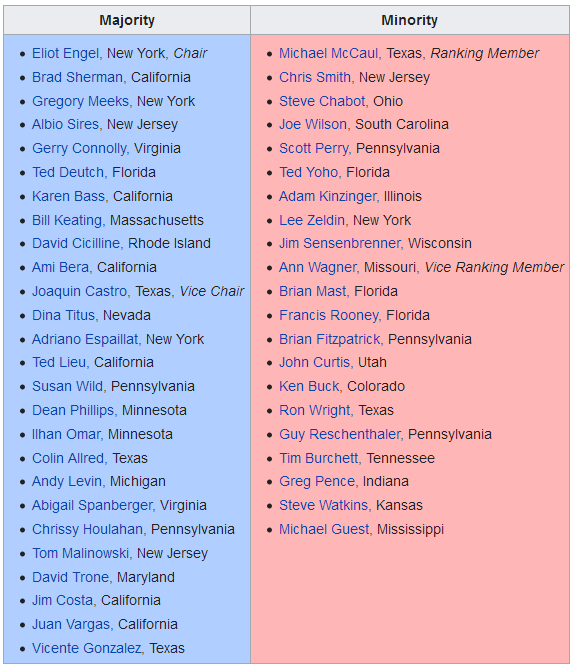
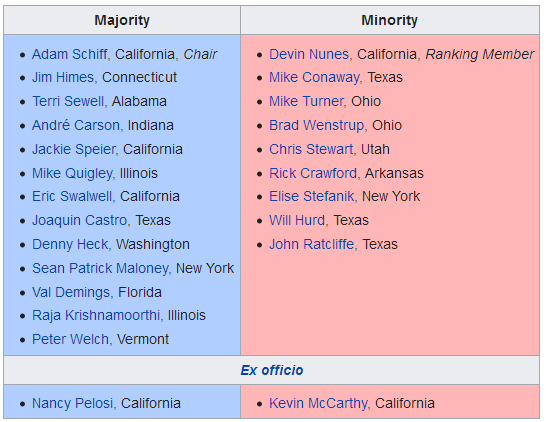
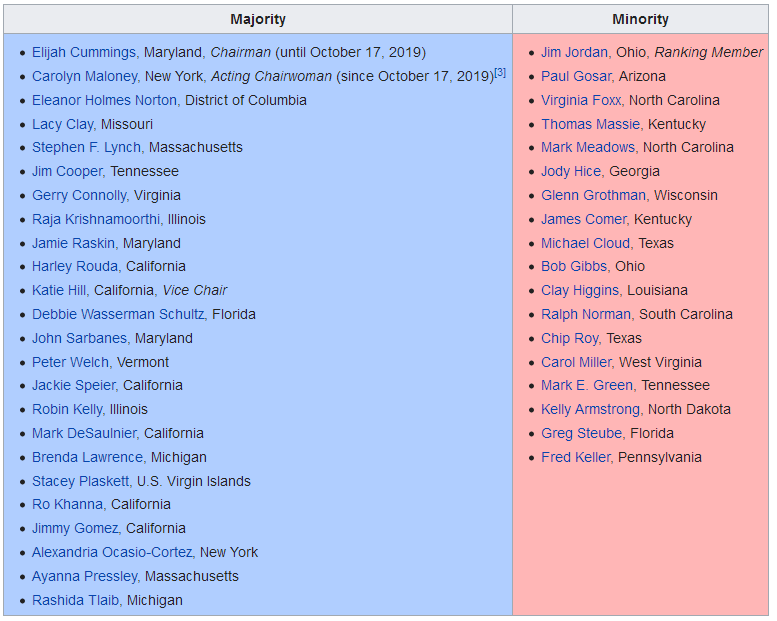
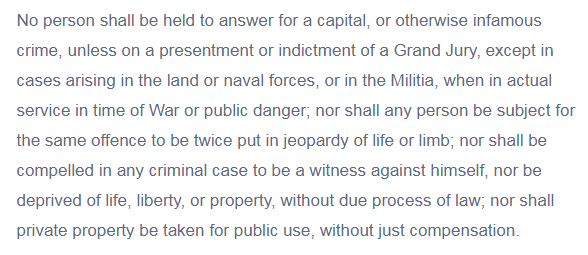
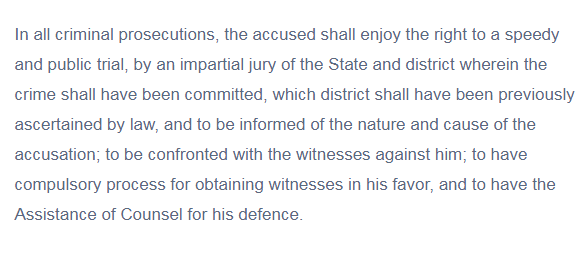
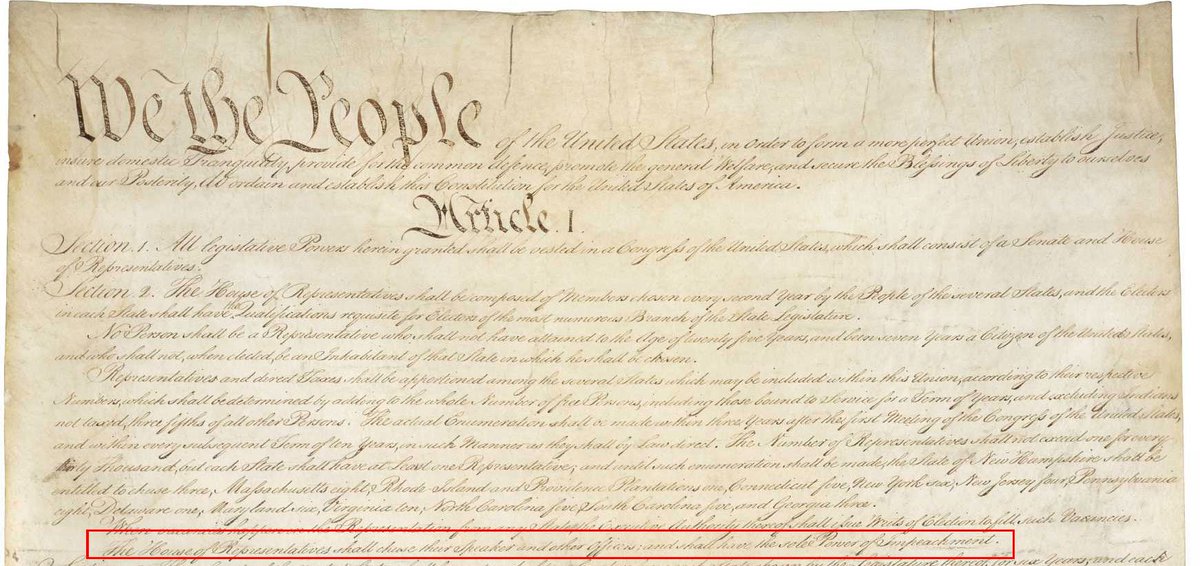
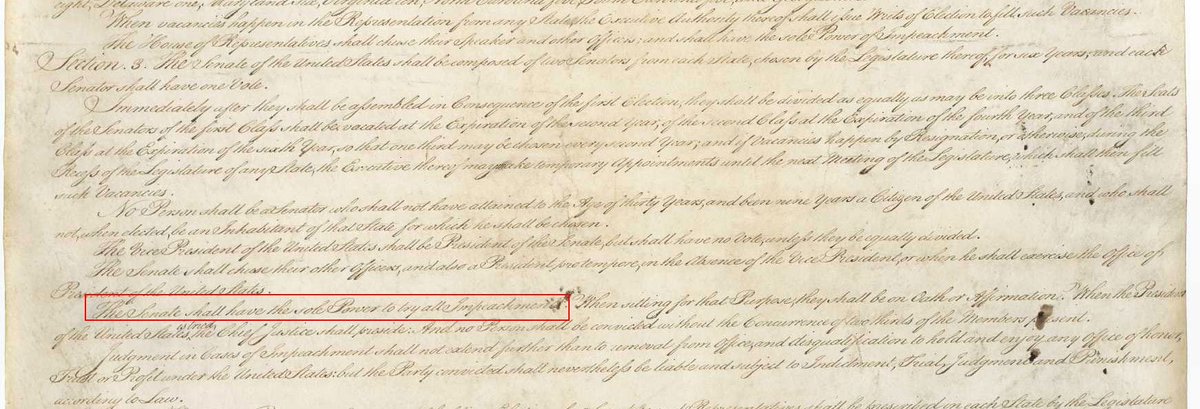
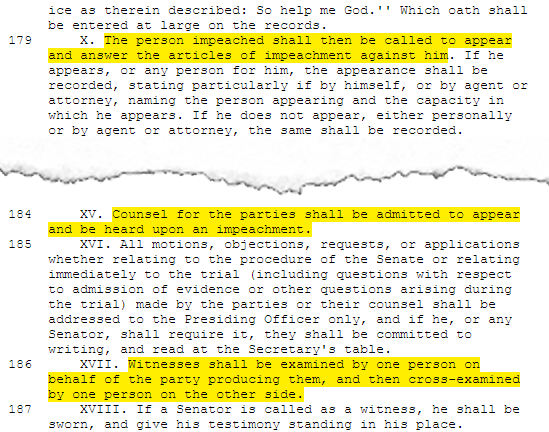
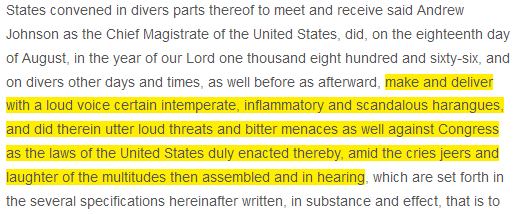 Bonus Impeachment Trivia! https://abs.twimg.com/emoji/v2/... draggable="false" alt="💫" title="Dizzy symbol" aria-label="Emoji: Dizzy symbol">While certainly prudent, no criminal accusation is necessary in an article of impeachment. The 10th article against Andrew Johnson boiled down to "he& #39;s a loud-mouthed bullying asshole, and also a complete laughing stock." https://www.nps.gov/anjo/lear..." title="https://abs.twimg.com/emoji/v2/... draggable="false" alt="💫" title="Dizzy symbol" aria-label="Emoji: Dizzy symbol"> Bonus Impeachment Trivia! https://abs.twimg.com/emoji/v2/... draggable="false" alt="💫" title="Dizzy symbol" aria-label="Emoji: Dizzy symbol">While certainly prudent, no criminal accusation is necessary in an article of impeachment. The 10th article against Andrew Johnson boiled down to "he& #39;s a loud-mouthed bullying asshole, and also a complete laughing stock." https://www.nps.gov/anjo/lear..." class="img-responsive" style="max-width:100%;"/>
Bonus Impeachment Trivia! https://abs.twimg.com/emoji/v2/... draggable="false" alt="💫" title="Dizzy symbol" aria-label="Emoji: Dizzy symbol">While certainly prudent, no criminal accusation is necessary in an article of impeachment. The 10th article against Andrew Johnson boiled down to "he& #39;s a loud-mouthed bullying asshole, and also a complete laughing stock." https://www.nps.gov/anjo/lear..." title="https://abs.twimg.com/emoji/v2/... draggable="false" alt="💫" title="Dizzy symbol" aria-label="Emoji: Dizzy symbol"> Bonus Impeachment Trivia! https://abs.twimg.com/emoji/v2/... draggable="false" alt="💫" title="Dizzy symbol" aria-label="Emoji: Dizzy symbol">While certainly prudent, no criminal accusation is necessary in an article of impeachment. The 10th article against Andrew Johnson boiled down to "he& #39;s a loud-mouthed bullying asshole, and also a complete laughing stock." https://www.nps.gov/anjo/lear..." class="img-responsive" style="max-width:100%;"/>


